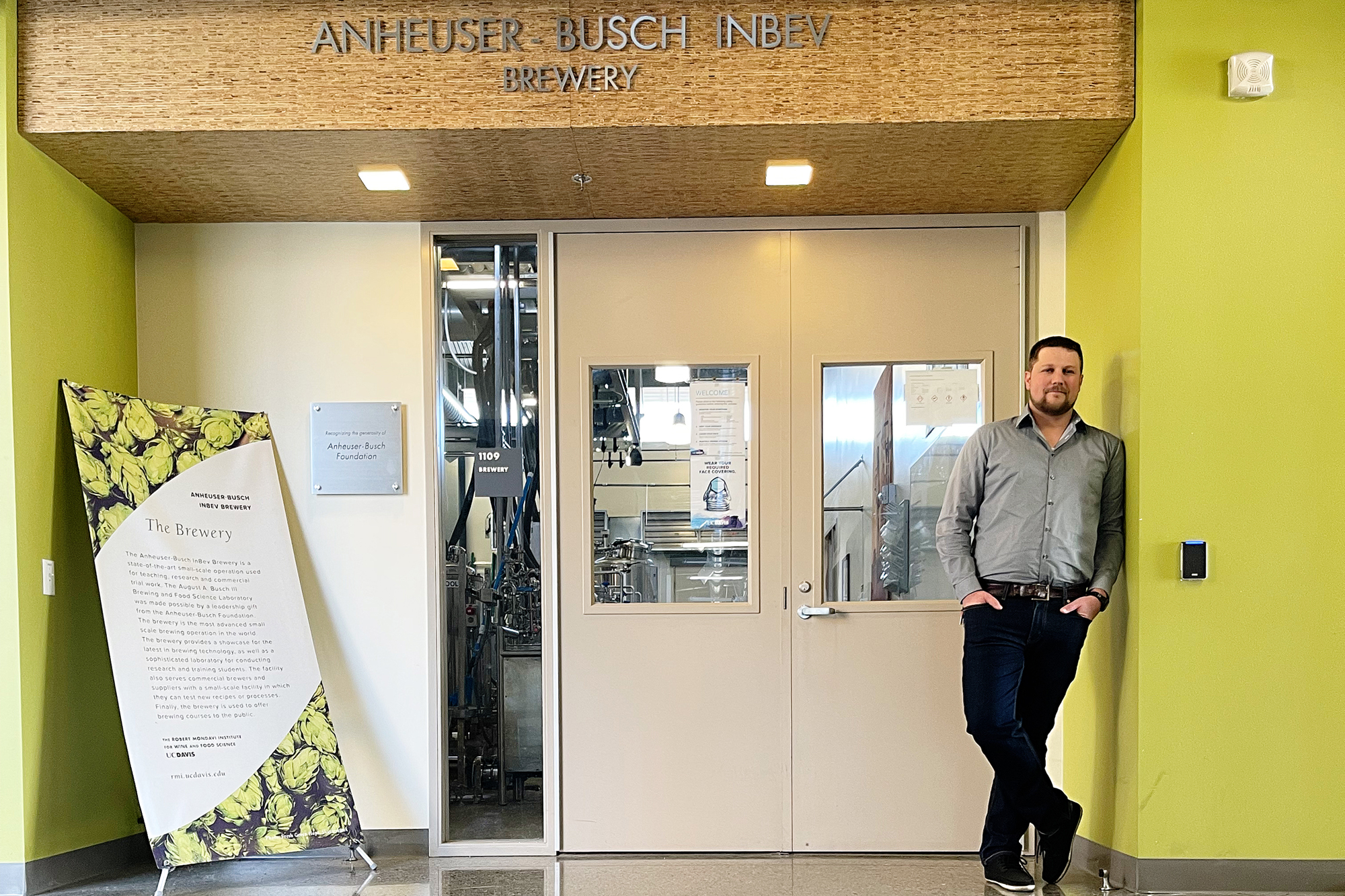
Brewing with Jon Hughes
CPE’s New Director of Brewing and Sensory Science Talks Craft Beer
With a Ph.D. in microbiology, Jonathan Hughes was initially headed down a different career path—one with arguably a lot less craft beer in it. But, after he landed a summer internship setting up the quality control lab at Heretic Brewing Company, he decided brewing was the field for him. He completed his graduate studies and spent the next four years at Heretic Brewing, eventually working his way up to quality assurance manager. During this time, he also began seeking out teaching opportunities, including introductory brewing classes at Sacramento State University and UC Davis. Now, he’s the new director of brewing and sensory science at UC Davis Continuing and Professional Education (CPE) and the microbiology instructor for the Master Brewers Certificate Program.
From homebrewing and quality assurance at an internationally known craft brewery to consulting and teaching tomorrow’s brewmasters, Hughes has extensive insight on the brewing industry and the experience and training necessary to be a part of it. Here’s a summary of our conversation with Hughes on brewing trends and the direction of CPE’s Brewing Program.
Brewing Education and Training
A common question from aspiring brewers is, “What education do you need to become a brewer?” Unlike other professions, there isn’t necessarily a prescribed path for becoming a brewer. Instead, Hughes stresses that getting both theoretical knowledge and hands-on experience is crucial for a successful career. “They are two sides of the same coin—both are equally important,” he says. While you don’t need a degree to become a brewer, he recommends academic study in the subjects of biology, chemistry, physics and engineering. For those interested in a deep dive in brewing science and engineering, the UC Davis Master Brewers Certificate Program touches on each of those aspects within the context of brewing. “This is absolutely going to help you with a leg up—our program is great on a résumé,” he says. “But make sure you work with someone who is also willing to teach you on the job.”

Brewing Jobs
There’s more to brewing than being a master brewer, and not everyone who wants to join the professional brewing community needs to become a brewer. “A very important part of a successful brewery is a great quality program,” he explains. Hughes adds that a lot of Master Brewers Certificate Program alumni go on to become quality assurance professionals at larger breweries, because quality requires a very technical understanding of the brewing process, for which the program provides a great foundation.
There’s also huge opportunity for work in distribution. Alcohol goes through a three-tiered system: primary producers, distribution companies and retailers. “I’ve met a lot of distributors and they have to know just as much about beer as brewers do so they can sell it to their clientele,” he says. “This can be lucrative and pay really well, so it’s certainly something people might want to look into.” There are also jobs in beer packaging, marketing and brewery health and safety.
Increasing Diversity in the Brewing Industry
The brewing industry is experiencing a trend in the right direction when it comes to increasing diversity. While Hughes acknowledges that there is still a lot of work to be done, he’s encouraged by the new and diverse breweries he sees popping up, such as Bow and Arrow Brewing Company in Albuquerque, New Mexico—the country’s first native woman-owned brewery, which focuses on using Indigenous and locally sourced ingredients. “Craft beer lovers have always sought whatever is new and diverse, and the fact that people can bring in these cultural aspects and create new and interesting products to satisfy that demand is extremely heartening.”
In terms of CPE’s contribution to diversity, Hughes points to the launch of the UC Davis “Tapping Potential” crowdfunded scholarship, designed to support diversity, leadership and cross-cultural understanding in the brewing industry and provide full enrollment to the online Master Brewers Certificate Program. The first recipient was just announced, and Hughes says there are plans to continue the scholarship with the hope of increasing the number of recipients in the coming years. Collaborations with associations like Global Ladies of Wort (founded by UC Davis Tapping Potential Scholarship winner Mariana da Silva Schneider) and Pink Boots Society are also in the works for CPE.
Hughes adds that making brewing education more accessible is going to be really important for seeing diversity increase. “Increasing access to education to people around the world is going to allow them to create better beer and get on the radar of craft beer lovers,” he says, referring to the rollout of the recent online version of the Master Brewers Certificate Program. Increasing the number of online brewing classes and brewing webinars, without sacrificing offerings of in-person brewing courses, will be a significant part of CPE’s Brewing Programs moving forward.
Want to see yourself in the brewing industry?
Don’t just learn how to make beer. Get in-depth training in brewing science and brewing engineering to turn your passion for brewing into a meaningful career. Schedule a one-on-one appointment with an enrollment coach to learn more about how our UC Davis Brewing Programs can help you.
The Future of Craft Beer
The craft beer scene is picking up in new corners of the world. According to Hughes, increasing levels of diversity in the industry is bringing new and interesting ideas to the forefront. “We’re seeing a lot in Japan, Korea and Scandinavia, and they are bringing in touches of their own cultures and it’s just wonderful,” he shares. Over the next five years, Hughes is also predicting a shift back toward smaller, local brew pubs focused on serving the community rather than global expansion.
